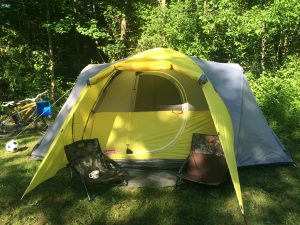 Aside from the camping essentials such as a tent, sleeping bag, first aid kit, etc., there are also some naturopathic essentials that can aid you while you are camping. I have outlined a couple of items that can help with camping through their diversity – meaning they can be used in multiple ways and in multiple situations. One should keep in mind that these items do not replace the need to seek medical attention in the event of experiencing signs and symptoms of any dysfunction.
Aside from the camping essentials such as a tent, sleeping bag, first aid kit, etc., there are also some naturopathic essentials that can aid you while you are camping. I have outlined a couple of items that can help with camping through their diversity – meaning they can be used in multiple ways and in multiple situations. One should keep in mind that these items do not replace the need to seek medical attention in the event of experiencing signs and symptoms of any dysfunction.
- Coconut water – coconut water acts as a great electrolyte which can be beneficial for those who are quite active while camping. It can help to nourish muscles and keep you hydrated – and hopefully prevent some muscle cramping. In addition, it can help those experiencing diarrhea, due to the potential to become dehydrated.
- Essential oils – everyone has their own preference for which essential oils they like, but I will recommend several of my favourites. Citronella and vanilla essential oils can both be beneficial as bug repellents. Using a couple of drops on your neck, wrist or ankles may help to ward off these pests. Keeping in mind that your sleep may be impacted while camping, having some lavender essential oil on hand may be helpful to encourage you to sleep.
- Homeopathics – Homeopathics can be quite useful for a variety of different concerns. In particular, I would most likely recommend at least Arnica and Apis – for trauma and bee stings respectively. If you are interested in knowing the top 5 homeopathic remedies to keep at home, visit my previous blog: https://www.plattsvilledoctor.ca/top-5-homeopathics-to-keep-at-home/
- Peppermint tea – Peppermint tea is a powerful therapeutic tool, because it can help with so many potential problems that could happen with camping. It can help to encourage sleep, settle upset stomachs, encourage movement with constipation, and fight infections. For more information on peppermint as a therapeutic herb, look to my previous blog: https://www.plattsvilledoctor.ca/health-benefits-of-peppermint/
- Coconut oil – Coconut oil and coconut water are quite different. Though they have similar constituents, they can help in different ways. Coconut oil can act as a great fungal infection fighter. In addition, using coconut oil for oil pulling can be beneficial if you cannot use toothpaste while camping. Oil pulling involves swishing some coconut oil around in your mouth for 10-20 minutes. This helps to keep your breath nice and fresh. It also has an SPF between 4 and 6, and can help moisten dry skin.
Have you benefited from reading this blog? Know someone that would benefit as well? Share, Like, Comment, or Tweet this article, and let me know what you think.
Some of the information provided above may not be appropriate for everyone, please consult with your doctor before trying any of the above. If you are interested in Naturopathic Medicine and wanting a different approach to your health care needs, contact Dr. Elisha Cook ND by calling 519-537-7058 and book your appointment today!


